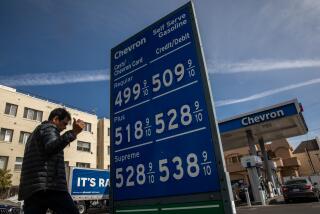Oil Prices Fall on Production Pledge
- Share via
Roller coaster crude oil prices dipped out of record territory Wednesday, falling more than 5% after several OPEC members said they supported a move to ease prices by pumping more oil.
The decline came as ministers for the Organization of the Petroleum Exporting Countries gathered in Beirut to discuss formally raising oil production quotas. Saudi Arabia and other OPEC nations have been under intense political pressure to boost output to rein in runaway oil prices and ease the outcry over record-high gasoline prices in the United States.
Gasoline prices have been the highest in California, hitting a record statewide average this week of $2.327 for a gallon of self-serve regular.
A new poll of about 500 Californians found that more than three-quarters of people surveyed blamed the jump on oil company profiteering rather than legitimate market conditions. According to the widely watched Field Poll, whose results were released Wednesday, 74% said gasoline costs were a “very serious” or “serious” problem for their households.
With high petroleum prices slamming everything from airlines to manufacturers worldwide, officials from the United States, Europe and other large oil users have pleaded with OPEC to rush more oil to the market to keep economies growing and quell fears that crude supplies can’t keep up with rising demand.
Over the weekend, those fears were heightened by attacks on an oil company office complex and a compound that houses foreign workers in the Saudi city of Khobar. The attack left 22 dead. In response, traders sent crude oil for July delivery soaring more than 6% on Tuesday to a record close of $42.33 a barrel on the New York Mercantile Exchange.
Members of OPEC -- which produce about one-third of the world’s oil -- issued a string of statements Wednesday to calm the crude markets ahead of today’s formal ministerial meeting.
“Everybody should produce what they want over the next few months,” said Qatar’s oil minister, Abdullah ibn Hamad al Attiyah, who added that the group was near a consensus to boost OPEC output quotas by 2.5 million barrels a day, or 11%, to 26 million barrels a day. “We do not want to see any shortage of supply at all, and we want to avoid shocks.”
Such promises may mean little because most of OPEC’s 11 member countries are already exceeding official production quotas and can’t boost output any further, oil experts have said. Those with remaining capacity -- Saudi Arabia, Kuwait and the United Arab Emirates -- have pledged to pump an additional 1 million barrels a day in June, Ahmed Fahd al Ahmed al Sabah, Kuwait’s oil minister, told Bloomberg News.
The statements from Beirut sent oil prices tumbling Wednesday as benchmark crude fell $2.37 to close at $39.96 in New York.
“Regardless of what OPEC says [today], there is more oil hitting the market, and a significant amount of additional oil hitting the market,” said John Kilduff, a senior vice president at commodities broker Fimat USA Inc. “I’ve really never seen OPEC with so much resolve to increase production in an effort to lower prices.”
The extra oil, he added, “is a huge counterweight” to worries about possible terrorist attacks on major oil production facilities. Kilduff believes up to $10 of the cost of crude was a reflection of market worries about reliable exports.
Philip Verleger, a consultant and energy analyst with the Council on Foreign Relations in New York, said he believed OPEC was making a mistake by increasing its output.
“The current high level of crude prices is totally related to gasoline and has nothing to do with the supply of crude oil,” he said. “When the gasoline bubble pops, and it is going to pop, then crude oil prices are going to come down ... and it’s going to go down viciously.”
Verleger said the OPEC move was largely political -- and temporary. “I think they will announce a production increase, they’ll push it for a while, and the prices will weaken, and they will back off real quick.” If OPEC’s move translates into lower gasoline prices, as many hope, that could also help oil companies in this country, which are being blamed for the high fuel prices.
Bloomberg News was used in compiling this report.
More to Read
Inside the business of entertainment
The Wide Shot brings you news, analysis and insights on everything from streaming wars to production — and what it all means for the future.
You may occasionally receive promotional content from the Los Angeles Times.










